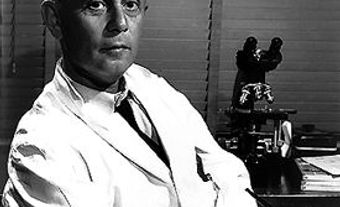The Armand-Frappier Santé Biotechnologie Research Centre, is part of the Institut national de la recherche scientifique (INRS). It is an important centre for research, training and technology transfer (see Medical Education).

Founding and Background
The Institut de microbiologie et d'hygiène de Montréal was established as an autonomous non-profit organization in 1938. In 1972, it was integrated into the Université du Québec and, in 1975, it became the Institut Armand-Frappier (IAF), named after its founding director, physician and microbiologist Armand Frappier.
The IAF became part of the Institut national de la recherche scientifique (INRS) in 1999. Today, the INRS- Armand-Frappier Santé Biotechnologie Research Centre is located on the Université du Québec campus, in the heart of Biotech City and in the Laval Science and High Technology Park.
All medical research in Canada, including research carried out at the INRS‒ Armand-Frappier Santé Biotechnologie Research Centre, is funded by the Canadian Institutes of Health Research (CIHR-IRSC). The centre brings together approximately 44 professors and 200 graduate students and postdoctoral fellows from different backgrounds, who pursue research and teach postgraduate students in human, animal and environmental health.
Research Objectives and Specializations
Four related objectives make INRS–Armand-Frappier Santé Biotechnologie Research Centre unique: research in microbiology and related sciences with applications for preventive medicine, industry and other nonmedical aspects; graduate and technical teaching (see Higher Education); services to public-health authorities, hospitals, universities, industry and the community (including viral and immunological diagnosis, epidemiological investigations, vaccinations and consultation); and the manufacture of biological products (vaccines, serums), diagnostic products and biological reagents. The centre’s other activities include commercial production and product quality control.
Topic specializations include bacteriology, epidemiology and preventive medicine, immunology, genetic engineering, comparative medicine, applied food sciences and virology. The centre’s academic researchers pursue a diverse range of interests and subjects such as cancer-associated lymphocyte signalling, the immune system’s reaction to environmental toxins, the effects of toxins on fish reproduction, and cellular damage caused by free radicals in the brain.
Areas of Focus and Research
Professors at the INRS– Armand-Frappier Santé Biotechnologie Research Centre apply their diverse expertise to the detection, prevention and treatment of various illnesses. Their scientific activity concentrates on three areas of focus and research: 1. Infectious diseases, immunity, cancer and epidemiology; 2. Microbiology and biotechnology; 3. Environmental toxicology and chemical pharmacology. Research studies in these areas have specific objectives. For example, molecular biology is concerned with bioorganic chemistry, physiological systems, enzyme inhibitors and peptide signalling, drug metabolism and doping control. A goal in biotechnology is to better understand the potential use of microorganisms in environmental remediation. Researchers in infectious diseases analyze the relationships between hosts and pathogens to better understand the role of the immune system. Researchers at INRS‒ Armand-Frappier Santé Biotechnologie Research Centre also examine animal models to improve scientific understanding of the role of vaccines in disease prevention and the interaction between viruses and hosts.
Influence and Reach
The INRS-Armand-Frappier Santé Biotechnologie Research Centre belongs to a number of renowned national and international research networks, including the Institut Pasteur International Network, which focuses on infectious diseases; the Réseau de recherche en santé environnementale; the Centre interinstitutionnel de recherche en écotoxicologie du Québec; and the Canadian Centre for Ethics in Sport.
Additionally, the centre offers research and community support services in chemistry, microbiology and immunology, genomics and proteomics, and molecular and cellular biology. Connected to the Centre national de biologie expérimentale, it is currently home to five Canada Research Chairs.
The centre houses the Armand-Frappier Museum, which specializes in bioscience interpretation. The museum hosts day camps and workshops designed to introduce people of all ages to microbiology and biotechnologies. Its various exhibitions, some of which are accessible online, showcase objects from the Armand-Frappier Collection and the Scientific and Educational Collection.

 Share on Facebook
Share on Facebook Share on X
Share on X Share by Email
Share by Email Share on Google Classroom
Share on Google Classroom



